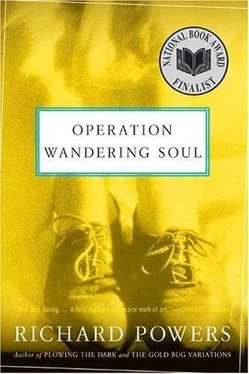Richard Powers - Operation Wandering Soul
Здесь есть возможность читать онлайн «Richard Powers - Operation Wandering Soul» весь текст электронной книги совершенно бесплатно (целиком полную версию без сокращений). В некоторых случаях можно слушать аудио, скачать через торрент в формате fb2 и присутствует краткое содержание. Год выпуска: 2002, Издательство: Harper Perennial, Жанр: Современная проза, на английском языке. Описание произведения, (предисловие) а так же отзывы посетителей доступны на портале библиотеки ЛибКат.
- Название:Operation Wandering Soul
- Автор:
- Издательство:Harper Perennial
- Жанр:
- Год:2002
- ISBN:нет данных
- Рейтинг книги:5 / 5. Голосов: 1
-
Избранное:Добавить в избранное
- Отзывы:
-
Ваша оценка:
- 100
- 1
- 2
- 3
- 4
- 5
Operation Wandering Soul: краткое содержание, описание и аннотация
Предлагаем к чтению аннотацию, описание, краткое содержание или предисловие (зависит от того, что написал сам автор книги «Operation Wandering Soul»). Если вы не нашли необходимую информацию о книге — напишите в комментариях, мы постараемся отыскать её.
Operation Wandering Soul — читать онлайн бесплатно полную книгу (весь текст) целиком
Ниже представлен текст книги, разбитый по страницам. Система сохранения места последней прочитанной страницы, позволяет с удобством читать онлайн бесплатно книгу «Operation Wandering Soul», без необходимости каждый раз заново искать на чём Вы остановились. Поставьте закладку, и сможете в любой момент перейти на страницу, на которой закончили чтение.
Интервал:
Закладка:
Fresco-inspired friezes, severe yet sensuous, tell of the need to replay the whole itinerary in miniature. Swelling rectangles add up to a radiant, full-page display, the fabulous rivals: Mecca itself, and, en face across the stapled spread, Jerusalem, the Holy Sepulcher. Each story panel moves the seeker closer to that ultimate end, the scale model City of God on Earth. From a great distance, it appears only as a gathering, anxious Crosshatch on the horizon. Still miles away over the plain, the towers become visible, then the walls. Then, at long last, the mammoth gate appears and opens, sparkling with celebratory stone revelation, ancient promises — detailed and intricate — carved everywhere into its cyclopean surface.
The dress becomes clear now, the style, time, and place. It is that interregnum of great faith, when most of the world knows this habitation to be almost spent. The globe is degraded; it corrodes only to be restored soon to its old original. Its oversoul migrates through a slow loop, one that narrows its noose to arrive at final things. Crisis cultures, cargo cults, nativistic movements, messianics: everyone on this road-strewn surface survives the present by naming it a station, an inscrutable detour on the way to the next age, the next image, the next frame.
The passes to the shrines of the blessed martyrs, the languishing trade routes are charged now with danger and salvation. An emerald mix of fear and need lights the spired horizons. Pen and color do not dare guess yet at topography's terminus, the shape of the hastening finish, except to fan the palmer's hope that arrival must surely be near, the end of the day of wandering in sight.
The Tour Guide — the Anointed, the Mahdi or Twelfth Imam, the Mahayana redeemer, the Nanabush — is shown preparing his many returns. In every town that the processions pass, the old order is smelted off. The novum is set to make its break. Strange, reified contours, miraculous and unexpected, get ready to rise up out of the earth's destruction. "Come the Fourth Kingdom…" the supertitles predict. "Come the Third Age…" Come the revolution, the return, the liberation, the overthrow, the transforming renewal… The mass pilgrimage rolls across these ocher hills, stopping for alms at all the pox spots of civilization. Suddenly, the stills reveal all: this disguised, private campaign, this jihad by another name, draws toward the emblem of all foretold spots, the city at the end of the world.
Illuminated saga retraces the eye's first excursion. To scan these lavish psalter sheets is almost to see through the panels from the other side, to surprise the reading youth under the sheets at night again. Arrows leading from square to square mark a flagstone picture path down which the strip's original owner raced by flashlight to reach story's end. The way is a seven-hundred-year shortcut back to an ancient destiny.
Back to boyhood, back to that moment when the medieval West sits inside a defensive moat rapidly filling up with rubble. The Christian world has restively expected its impending end for twelve hundred years. It waits at this very moment, more certain of now than ever. God's tune rushes to cadence.
"True," a series of recapitulating panels concedes, "prior clockwatchers have been wrong." Many expect the old heaven and earth to burn away just as the Anointed, Antichrist Sylvester II, pronounces midnight mass on December 31, 999. Comets blazed brilliantly in advance. At the sound of transubstantiation's bell, people across the continent drop to the ground, expectant. In reprieve's let-down, hurried calculations produce another thirty years of grace. And when that extension also expires, seers settle on a new due date.
Numbers prove pliable. Sooner discard the calendar than the drift toward cartoon apocalypse it was built to predict. "Not the year 1000!" a Gnostic calculator proclaims in his cold stone cell, the astonished correction coming out his mouth in a speech bubble as old as Romanesque ecclesiastical comics. "The thousand-year reign of majesty here on earth!" Then two frames, scalloped to show they come from his monk's mind's eye: crypts opening, the martyrs resurrected to serve as kings in the new world's political machine, perfected at last.
Broadly announced now, bruited about all lands in caption and image: the Last Emperor, the ultimate successor of the Prankish kings, will soon assemble a host and make the long passage across the Middle Sea to recover by force the earthly sign of heavenly metropolis. There men will prepare the way for the Second Coming. Pilgrims return molested from the Holy Land, cries of protest filling the air above their heads. When a bubble-call for help comes from Pope Urban II, standing on a balcony in the South of France and beseeching a crowd to turn its random havoc into a single, sanctified, militant pilgrimage, his "Deus volt" is magnified a millionfold. All ranks and social stations catch fire. Europe launches itself into the new age it has long been predicting.
But the fall of the Holy City fails to bring on the last battle. Muslim and Jew are duly slaughtered to make way for Jerusalem's new inhabitants. Sovereign states are drawn up on the Levant map, diamonds designating the cities the pilgrim generals dole out among themselves: Antioch to one, Tripoli shores to another, Acre and Beirut to a third. No sooner is the new world order established than Zangi, Nureddin, and Saladin mount holy encircling maneuvers of their own.
The West, flexing itself in foreign contact, launches another wave of its eschatologically charged faithful into the World's Debate. France and Germany, the princes of Bohemia, Swabia, Poland, and Byzantium join forces under the cross. Armies of incompatible nationals pour into the Near East. But rival millennial expectations among allies prove fatal. The Second Crusade ends with a senseless attack on Damascus, executed in a disastrous fade to indigo and black.
The City of Heaven on Earth, ruled for a while by a thirteen-year-old leper, teeters on the brink, shattered by sectarian bickering. The crusader armies mass yet again for Armageddon, and are once more destroyed. Jerusalem falls again and is lost before God has a chance to install His transcelestial bureaucracy. The end of history is postponed for another few pages.
A third call for a God-willed showdown sounds across a catholic confederation too sophisticated now to hear it the way it first did, a century before. England's Lion-Heart signs on, along with Sicily, Flanders, and the Danes. They grab Cyprus as jumping-off point. Frederick Barbarossa, a furious seventy, leads the Germans cross-continent to a brilliant victory, only to drown — in intricately inked irony — crossing a stream.
Spiritual fervor degrades into a cynical race for fiefs. Holy war gives way to political shrewdness, the deftly drawn fourth campaign. The international hammerblow aimed at recovering Jerusalem, deflected by backroom Venetian power broking, ends not in sieges of infidel strongholds but in a brutal sack of Christian Constantinople. The soldiers of the cross succeed in tearing the two churches apart forever. They shatter and slice up Byzantium — beautifully penned in strategic and tactical views — the jewel that for so long formed the first line of defense against encroaching East, dealing it a wound from which it never recovers.
All this unfurls in four and a quarter pages, a dozen hand-colored rectangles per side. Then focus narrows another notch. The centuries-meandering road cants into a valley where the story's boy hides this time. (Watching these accounts of upheaval pour in, the flashlight reader marvels at how it is always them, the brigade of the displaced, each time out with the same names, the same age, the same slim chance of ever arriving by candlelight, let alone getting back again.)
Читать дальшеИнтервал:
Закладка:
Похожие книги на «Operation Wandering Soul»
Представляем Вашему вниманию похожие книги на «Operation Wandering Soul» списком для выбора. Мы отобрали схожую по названию и смыслу литературу в надежде предоставить читателям больше вариантов отыскать новые, интересные, ещё непрочитанные произведения.
Обсуждение, отзывы о книге «Operation Wandering Soul» и просто собственные мнения читателей. Оставьте ваши комментарии, напишите, что Вы думаете о произведении, его смысле или главных героях. Укажите что конкретно понравилось, а что нет, и почему Вы так считаете.












